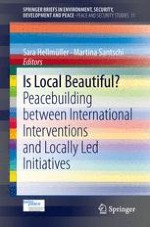2014 | OriginalPaper | Buchkapitel
4. Traditional Authorities, Local Justice and Local Conflict Resolution Mechanisms in South Sudan
verfasst von : Martina Santschi
Erschienen in: Is Local Beautiful?
Aktivieren Sie unsere intelligente Suche, um passende Fachinhalte oder Patente zu finden.
Wählen Sie Textabschnitte aus um mit Künstlicher Intelligenz passenden Patente zu finden. powered by
Markieren Sie Textabschnitte, um KI-gestützt weitere passende Inhalte zu finden. powered by
